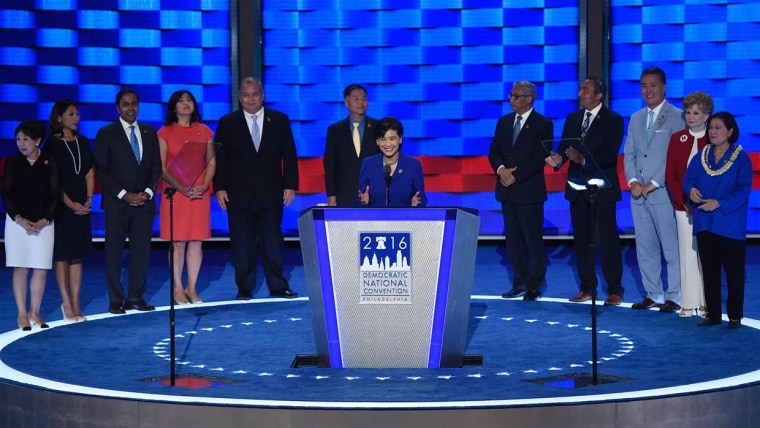As the race for Democratic National Committee (DNC) Chair heats up, the party of FDR will need to learn from the missteps of 2016 and must continue to implement programs that proved successful. For the latter, engagement with the Asian American and Pacific Islander (AAPI) community cannot take a back seat in the shuffle of new priorities.
AAPI voters came out in full force on November 8: the Democratic Party’s presidential contender clearly won the Asian vote last November and a historic number of AAPI members were elected to Congress. To ignore this non-monolithic, fiercely loyal community is to commit political malpractice, especially for a group that will double in voting size by 2040.
Before new leadership takes the reins of the more diverse political party, it’s important to stress that certain practices must be institutionalized when it comes to AAPI political activism. These points serve as a reminder about what our party stands for and what must be sustained with regard to engaging the AAPI community.
The party must foster AAPI engagement entirely
Effective party engagement involves the trifecta of political and grassroots relationships; a robust communications operation; and connected fundraising efforts. Historically, the DNC has hired constituency-experts for each of these areas, but rarely at the same time. This practice must change to facilitate a community that is still becoming sophisticated in American politics. A more developed team-based effort by the DNC and national campaigns will ensure that more AAPIs will be engaged than historically reported per election cycle, at least at a higher rate than the 42 percent reported for this past year.
RELATED: These Democratic Lawmakers Won't Attend Trump's Inauguration
Stronger support for state parties means stronger political support nationally
The DNC and other national campaigns must learn that engaging AAPIs cannot be limited to working through state parties. In fact, many AAPIs who are progressive-leaning to do not even register for the political party they will support in an election year. The result is an AAPI community that is led by a wide array of local and grassroots leaders across the country. However, AAPI caucuses are uniquely positioned to bring in these unaffiliated voters.
Many state parties recognize AAPI caucuses within their structure. These caucuses work to organize AAPIs through the state party, and their efforts include voter registration, in-language phone banking and canvassing, as well as holding social gatherings. However, many, if not all, state AAPI caucuses do not even have the basic funds supplied to them by the state parties, leaving them to spend time fundraising instead of bringing new AAPI voters into the fold. This is not surprising since state parties keep a close eye on their purse strings; however, weak caucuses mean that activation during election season will prove fruitless. As the new DNC Chair determines how best to support state parties, support for these state caucuses is key to building grassroots support.
RELATED: Illinois' First Indian-American Representative Is Ready to Work 'Across the Aisle'
AAPI donors need a buy-in
AAPI donors want their financial contributions to directly support AAPI engagement efforts. This includes updating voter files to include AAPIs, translating materials, and developing communication pieces aimed at the AAPI community. The party should develop some mechanism where contributions can be tied directly to program development. Especially in an era where the White House is not occupied by a Democrat, donors will need additional motivating factors to continue supporting the party.
Committing to ongoing dialogue and engagement will bring electoral rewards
While conventional wisdom for AAPI engagement calls for significant investment in translating materials (which is accurate), the party must also focus on a continual conversation that is not limited to the months or year leading up to an election. Consistent voter education on an ongoing basis via emails, mailers, or even traditional field programmatic efforts ensures that AAPI voters are aware of what challenges the Democratic Party faces at the state and national level. Placing ads or op-eds within in-language publications promises a robust turnout when the party comes knocking during election season.
RELATED: Department of Justice Files to Join Lawsuit Over Voter Purge
A modern political party needs a system for receiving feedback and implementing change
The party needs to create stronger mechanisms for taking in fresh ideas. More importantly, executing on these ideas will make the difference between a mediocre operation and a superb one. There must be flexibility and a desire to adapt to the needs of a community that boasts a diversity of cultures, traditions and languages. This means more than having an AAPI Engagement Desk. The party as a whole must be willing to take whatever steps are necessary to support engagement efforts.
Koustubh "K.J." Bagchi was formerly the DNC's AAPI Engagement Director and Hillary for America's AAPI Finance Director.
Follow NBC Asian America on Facebook, Twitter, Instagram and Tumblr.
